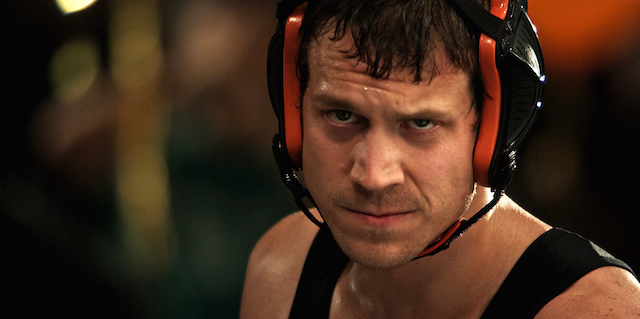
UPDATE – 10/24/11: I’m pleased to report that THE HAMMER (a.k.a. HAMILL) has acquired distribution and will be playing in select theaters starting October 27, 2011. For tickets and theater information, visit THIS SITE.
———
Overcoming the necessary obstacles in order to get your story out to the masses is a daunting aspect of independent filmmaking. With the current state of distribution, the obstacles are bigger than ever. If you’re unwilling to compromise your vision, the battle becomes even tougher, especially when your project portrays a unique world that general audiences are unfamiliar with. That being said, with big risks come big rewards and telling a powerful, unconventional story is the first step to making an impact on a large scale.
Filmmakers EBEN KOSTBAR and JOSEPH MCKELHEER understand this, and they are currently entrenched in this kind of battle with their latest film HAMILL, the true story of deaf UFC fighter, Matt Hamill. Directed by OREN KAPLAN, it’s the inspiring journey of a man who, for most of his life, has found himself awkwardly caught between the worlds of the hearing and the non-hearing. It’s very much a classic underdog sports story that would touch and inspire the hearts and minds of most moviegoers should it garner a wide theatrical release (trailer below).
In order to remain true to Matt Hamill’s story and portray the Deaf and Hard of Hearing communities accurately, Eben and Joseph (co-writers and co-producers) chose to take some risks that they knew could impact their chances with distributors. They decided to cast smaller, unknown actors, such as deaf actor RUSSELL HARVARD (There Will Be Blood) in the title role. They also utilized open captioning and specific sound design to bring us into Hamill’s world, sometimes deliberately depriving our senses on screen.
Having only screened at five film festivals thus far, they’ve already collected a handful of awards (they’re five for five at the fests they’ve played at including the AFI Fest’s prestigious Audience Award). They also have approval from the largest Deaf organizations in the country, not to mention the vocal support they’ve received from the other core audiences portrayed in the film (the Deaf, mixed martial arts, and wrestling communities). Needless to say, Eben and Joseph are very optimistic about Hamill’s chances at a wide release.
In late February I sat down with the duo to discuss the obstacles they’ve had to overcome in order to bring Matt Hamill’s life to the screen, as well as their strategy for building a dedicated fan base that will help prove to distributors that this film belongs in theaters.
HAMILL screens at the 2011 Newport Beach Film Festival in Newport Beach, California on Saturday, April 30th and Thursday, May 5th. Buy tickets HERE.
WILL PRESCOTT: This film has potential to make a huge impact on the Deaf community—either positively or negatively. How did this affect the choices you made during production?
EBEN KOSTBAR: Well, five years ago, when we were developing this, the big challenge was, are we going to go with deaf actors or not? I’m an actor, Joe’s an actor, we developed this with me acting and Joe directing. We quickly realized that this is the wrong way to go because you learn about Deaf culture and you realize deaf actors should be playing these roles. They obviously bring a lot more authenticity to the parts. Unfortunately, there’s no deaf male lead that’s a name actor. And that’s important when you’re putting a project together and asking investors for money, because that’s ultimately going to determine to distributors that you can get that chunk of money back.
JOSEPH MCKELHEER: At the beginning we weren’t thinking about hearing actors versus deaf actors. We didn’t really see anything wrong with it at the beginning. We were like, “What do you mean? This person is an actor. An actor can play deaf.” We learned quickly that’s not going to fly and we learned why. We came to understand the Deaf community’s point of view.
WP: So, despite the potential distribution problems, you went with unknown, deaf actors anyway?
EK: Yeah. We said you know what, with this type of project, if we’re really going to shake things up and make an impact, let’s hire all deaf actors for the roles. Let’s bring in some deaf crew people or deaf producers so they can teach us about their culture and really create this subplot to the story. Yeah, it’s your classic sports underdog story about a guy overcoming all obstacles, but we’ve see that a million times. And what’s interesting is that there’s a group of people out there who haven’t been portrayed like this on the screen yet. Or at least portrayed properly.
WP: But it was still difficult to get made.
EK: A lot of the reason why this film took five plus years was because the early creative decisions were met with challenges. But all of the great things about this film are the challenges we’re facing now. The deaf actors not being name actors was a good thing because we wanted to open up opportunities for them, because it gives more authenticity to the film. We implemented open captioning throughout the film because we wanted it accessible. The big picture plan is that we want deaf people to go to the theater because right now they can only go to selected times or to theaters with special equipment where they can read the subtitles.
JM: Or wait for the film to come out on DVD with closed captioning.
EK: Right. This is our vision. We want deaf and hard of hearing people to be able to go to the theater together and experience it with other hearing people. It creates two things: One, it gives them an opportunity to go to a theater just like any hearing person. And two, it creates this cool dynamic of deaf and hearing people being in an audience at the same time. They laugh together and cry together.
JM: That’s what it’s all about. The film is really about emerging the two cultures together and allowing each culture to have an awareness of the other.
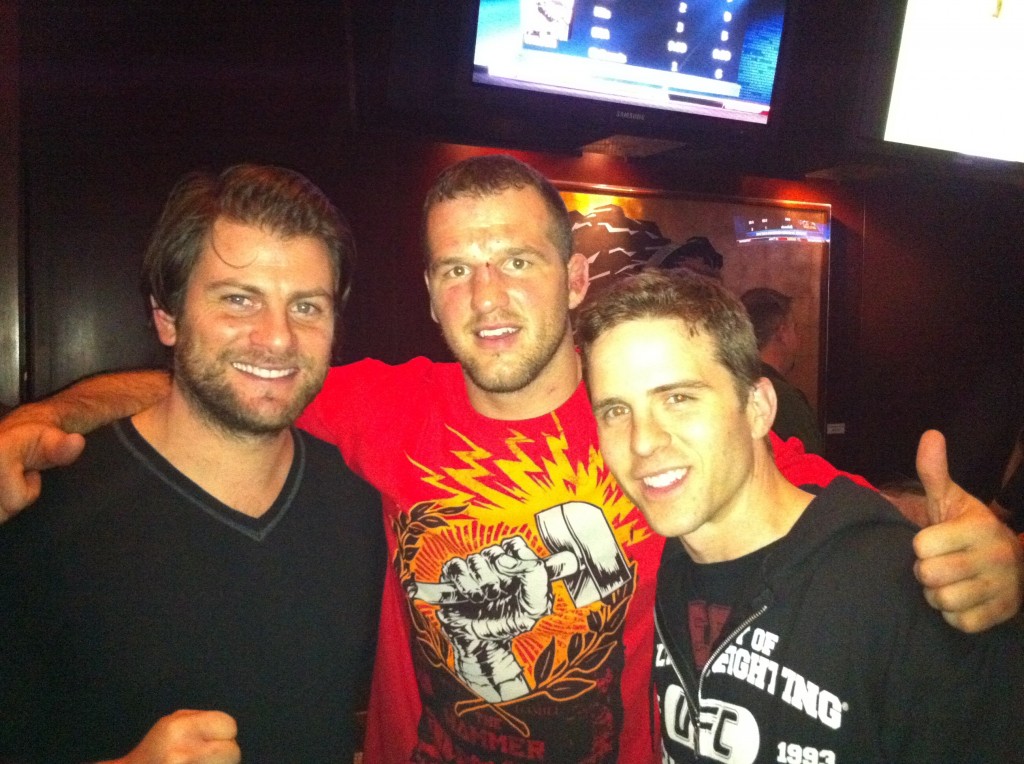
WP: And Matt Hamill’s life is a great vehicle to do this since he’s very much a part of both cultures. How did you even come up with the idea to tell his story in the first place?
EK: I saw Matt on this reality TV show and told Joe we should go see him at this Deaf school where he was speaking at a wrestling tournament. It’s a K-12 school called California School for the Deaf and it’s in Fremont. They have deaf faculty, deaf principles, etc. They call it Deaf Town. That’s their slang term. They tell you to turn off your voice because they want you to get thrown into their world, their language, American Sign Language. So we spent a weekend with Matt, at this school, and we were just blown away by this culture. How cool would it be if we could portray this on the screen and let other people into this world a little bit?
WP: When was this?
JM: This has been a five-year process. Eben first saw him and called me and said check this guy out. I was like, “Cage fighting?” I wasn’t really into it at first. But we went and met him and were like, “He has a really inspiring story. We have to make it.” It took us a couple of years to write the script.
WP: And he was involved along the way? The whole time?
JM: Yeah. Matt was such a good guy. And we really wanted to do two things. We wanted to handle his life appropriately and handle the Deaf community appropriately. So we had a handshake deal with him that he’d have approval on the script.
EK: And we really did have a handshake deal [laughs]. We didn’t even have a contract for the first year. How scary is that? We’ll never do that again.
WP: How difficult was it working with him since this is his story?
JM: It presented some challenges because, imagine if someone was going to make your life story and wanted to change it because it didn’t fit into a movie format or a three-act structure. You’d say, “That’s not the way it went!” So it created some challenges, but at the end of the day there’s not a whole lot of movie magic and it’s really accurate. It’s something that Matt’s happy with.
WP: As storytellers who can hear, did Matt or anyone else have issues with you being able to relate to their struggles?
JM: If you’re deaf and approached by people wanting to make this film, your first response is going to be, “Why are two hearing guys making this film?” We stumbled upon this many times.
EK: But we had open arms. We said, “Tell us who to work with. We want to work with deaf crew and deaf actors. We want to create opportunities for them.” Hopefully Hamill gets out there and people learn more about the community, for example, a lot of people call them “hearing impaired,” but that’s not the proper term. They’re deaf and they don’t see it as a bad thing. Deaf represents their culture. Like American Sign Language is their language, not English. English is their second language. And as cheesy as this might sound to some people, it’s these educational sub tones that are in the film.

WP: Let’s talk about some of those deaf actors. Russell Harvard did excellent as Hamill but, Eben, you were originally supposed to play the lead role, right?
EK: [Laughs] A long time ago. And Joe was gonna direct it! We’re actors. We come from acting backgrounds. Joe did a film called Godspeed, which was the first film under Film Harvest. Everything came from let’s create opportunities for ourselves and also we wanted to make film. So, when I saw Hamill, I was like I wrestled, I can learn sign language, I sort of resemble him. Not really, but kinda.
JM: Hamill is six-three.
EK: I know! [laughs] But yeah, I put so much into it. I got hearing aids. I went and took classes. Like, I know Sign Language now, which eventually helped because it got thrown into the story.
JM: Eventually there was so much controversy over Eben playing the role that it made us second guess ourselves. And now, you know, we’d never go back. Anybody making a film about a deaf person you got to cast a deaf actor. It just has to be that way.
WP: So you fired Eben and hired Russell?
JM: Yeah. And one of the examples we gave to investors for why we were going go with a deaf actor was There Will Be Blood. Paul Thomas Anderson recast the role of the older version of Daniel Day-Lewis’ son (played by Russell Harvard) with a deaf actor. Initially, and I’m not sure if I’m totally correct on this, they hired a hearing actor to play that role and during shooting there was some controversy and they recast. They were shooting in Texas and Russell is based in Austin, and they cast him.
WP: Was Russell a wrestler?
EK: No! Talk about a casting challenge. The actor who plays Matt has to be deaf, not hard of hearing, there’s a difference. He has to know sign language, which a lot of deaf people don’t know.
JM: He has to be oral.
EK: Has to be oral, which a lot of deaf people aren’t oral. Matt is very oral and can speak very well. He also has to look like Matt to a certain degree; he has to be in the same age group. Has to play from high school to age 32. You know, he has to be old enough where he can play older, but not too old that he can’t play younger.
WP: Wow.
EK: And if he doesn’t wrestle, he has to still be athletic enough to pull some moves off. I mean, that’s like a casting nightmare.
WP: That’s tough.
JM: There was one guy. Literally only one guy that we found and I think we did a pretty extensive search.
EK: And actually, we took a leap of faith with Russell. Deaf actors, a lot of times, just haven’t gotten the acting experience yet, you know, just like any young actors. But they (deaf and hard of hearing actors) don’t have the opportunities, unfortunately, and even less experience. So when we were looking for Matt, besides all the casting challenges, just in terms of acting, a lot of people we saw just weren’t ready yet. And the fact that Russell played opposite Daniel Day-Lewis, I mean, come on. You have to be pretty good.
JM: He was the bastard in the basket.
EK: Love that scene.

WP: So how did you get at him? How did you get him the script?
JM: We were writing the script when There Will Be Blood came out. So his name came up right away, but we were originally going to cast him as the best friend role (played by Michael Anthony Spady). We never really considered Russell and always thought we’d find someone a little bit younger. But he was right there the whole time.
EK: It’s so weird with the casting and things in general with this project, how they fell into place. The best friend role, Jay, is a great example. Michael Spady stole the show. I bartended on the side for years where I met Michael and just like his character, he had this eccentric personality. He was deaf, but it never really clicked that he’d play Jay because we kept thinking he had to be white because the original best friend is white. But after we couldn’t find Jay, casting-wise, we were like, “What about this guy?”
JM: And he won the job.
EK: And it’s cool. Having a black actor play a white role. I mean, who cares? We asked the real Jay and he was like, “Yeah. Sure. I don’t care.”
WP: So what about Oren Kaplan (the director)? When did he come onboard?
JM: I worked with Oren on a movie called The Hamiltons. He was the Second AC (Assistant Camera) and the Executive Producer. Odd combination.
WP: That is odd.
JM: He started doing a lot of web stuff for Disney, tons of content that wasn’t feature length. We had stayed in contact and were looking for a director who was talented and just starting out like us. We had put a lot of work into this project and didn’t want someone to come on the project and just direct it and walk away. We wanted to make sure there was that commitment long term. He’s been on this project for two years now and he’s got another two to go at least. It’s a big commitment for a director, or any indie filmmaker for that matter.
EK: From working for Disney, Oren had the eye and still does, to create a more commercial looking film that, I don’t know how to say this the right way, doesn’t look so…
JM: Indie.
EK: Yeah. Indie. For lack of a better word. It’s a classic sports underdog story and deserved to have kinda like, you know—
JM: More mainstream appeal.
EK: Yeah. More mainstream appeal. So, the fact Oren worked at Disney and had done work like this, we trusted his vision, and I think he hit a home run, especially with the resources he had.
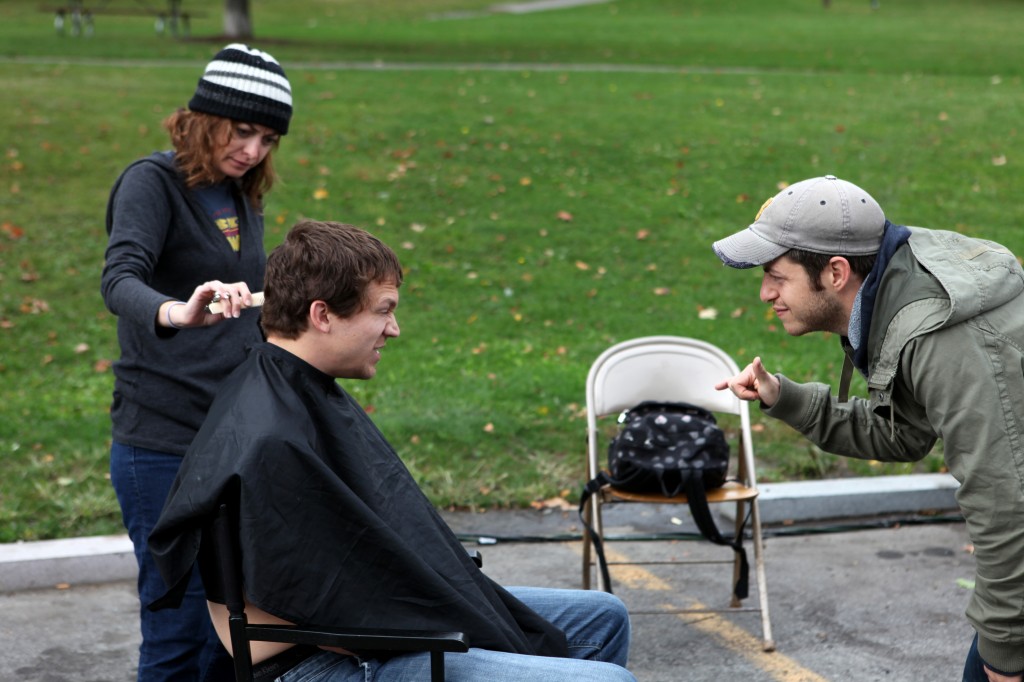
WP: You guys certainly did some great things with the sound design.
EK: Geoff Green (sound designer), who we’ve worked with before, did amazing work. We still think that one of the coolest things about this film is the sound design. You really step into Matt Hamill’s shoes and see what it’s like to be deaf for two hours. Geoff really came up with some cool, interesting things.
JM: It was an interesting process because it was all in the script, but it maybe wasn’t as effective in the script as it was in the final product you saw. Geoff really took what we created in the script and thought it through from a practical position. He was on the phone with an audiologist and really did the research in terms of what, for example, sounds would sound like with hearing aids.
EK: And not only hearing aids but what it would sound like with only one hearing aid because Matt only wears one in one ear. You know, the differences. The frequencies. The little things you probably don’t pick up when you initially watch it, but then when they all come together when you experience it. It was a challenge, especially in the developmental stages, because they were saying you’ve got to be careful because of all those silent moments. You already have a pretty silent film and then big gaps of silence. The majority of your audience will be a hearing audience and they’re going to get bored reading subtitles. So, it’s making it cool but still having it flow consistently throughout the film. It was a challenge to find a happy medium.
WP: One of the coolest things I found about Matt’s character is that you have this guy, and I want to know how realistic it is, but you have this guy who doesn’t fit in either world—he’s raised one way and then he goes to the Deaf school that he doesn’t fit into as well. Is this straight out of his life?
JM: Yeah.
EK: Yeah. From the very, very first meeting we had with him at the school we met him at, he told us how he felt like he’s not in both. He feels like he can fit into both, but he doesn’t associate with “I’m just deaf,” or “I’m just hard of hearing.”
JM: That’s how he felt growing up. That’s how he was raised and wants to maintain to this day. He always said he was grateful he went to RIT (Rochester Institute of Technology) and that opened up his world to the Deaf community because he hadn’t had that experience before. But, you know, he doesn’t necessarily want to be represented as someone from the Deaf community. He wants to be in the middle. And he wants to live his life in the middle of those two cultures. There is a distinction between the two and he doesn’t necessarily want to be grouped into either.
EK: He’s definitely proud to be Deaf. He doesn’t deny it or anything like that. He’s not an extremist one way or the other. Shoshannah Stern’s character in the film, Kristi, would be an example of what they call “Deaf” with a capital “D”. Meaning true Deaf culture, American Sign Language, they don’t believe in speaking because that’s not them. They believe you must learn their language, American Sign Language, I’ll learn English, but I’m deaf and this is what I believe in. And so, when constructing the project we were like, “Let’s just tell Matt’s story.” He grew up in a hearing world and would eventually embrace the fact that he is deaf and learn about his culture and who he is. That’s his journey. It’s not every deaf person’s journey. Through telling his story you learn so many different layers about the Deaf and hard of hearing cultures.
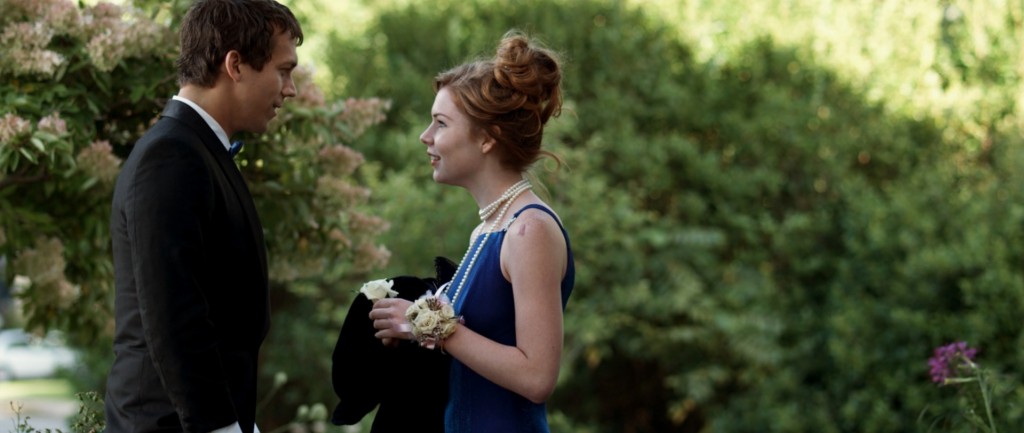
WP: Absolutely. It’s really educational in that sense. With Matt being caught between these two worlds, it really helps you as an audience member to empathize with him, while learning so much about the culture through his journey.
JM: That was our original idea. Here’s a deaf kid growing up in a hearing world and he’s a total fish out of water. And then, when he finally gets to the world you think he should be in, he’s a fish out of water still. We didn’t want to be too preachy about the Deaf community either. and we didn’t want to treat being deaf as too negative or anything. It was a fine line we had to walk.
EK: A lot of people will say, and even Matt, that they see being deaf as a gift. Where initially, when he was brought up, he was fighting against it. But now he says that it’s a gift and he wouldn’t be the person he is without the fact that he’s deaf.
JM: If you ask most deaf people if they had the ability to hear would they take it? Most will say no. And that was the moment in time when the light bulb went on for us. Oh, okay, I get it. I totally get it now.
EK: Our vision on the writing side was to do a 180-degree swap for the audience members. As a deaf audience member you’re thrust into a hearing world, like they normally are for about 90 percent of the day. So, in the beginning of the film, they’re forced to do what they always do by reading the subtitles or reading lips. But then all the sudden it’s flipped when Matt goes to RIT and they have sign language and they’re in their own world and the hearing audience is forced to read the subtitles. Hopefully, as a hearing audience member, when that happens and the sound cuts out, a light will go on and they’ll say, “Wow this is cool. It’s like this visual language, and there’s no sound, and they’re talking and there’s so much going on.”
WP: Yeah. I definitely felt that while watching. Hopefully it carries over to a much wider audience.
JM: That’s the goal.
WP: So, what are the future planes for the film?
JM: Well, right now we are really pushing for a theatrical release. We want to start with a small theatrical release and grow from there.
WP: Do you have a distribution deal?
JM: Right now no one is saying let’s take it wide release. So we have to do it ourselves and hold off on distribution deals that don’t include a theatrical release.
EK: There are a few companies out there who like it and specialize in strong niche-type films, but most of them are based on us bringing in the P&A money (Prints and Advertising), the marketing money, because they don’t want to risk as much.
JM: From the perspective of the distributors, the film has no business being in a wide release. What we’re trying to do is prove that there is an audience for it and the only way we can do it is by doing it ourselves and starting small. We’ll use a specific strategy catered to our core markets and use a guerilla marketing campaign, a viral campaign, that supports this and helps our growth until we get into a stage where we can show people that there is an audience for this film.
EK: And for our type of budget, our indie budget, we’ve made some huge alliances. We have every top Deaf organization, the president of the largest Deaf university, Gallaudet, is sponsoring the film. The president of RIT. UFC and Tapout are sponsoring the film. Most independent films don’t have these alliances. We have the infrastructure; we just need to get that relationship going with a distributor that’s willing to put their neck on the line so we can show them the true potential of this film.
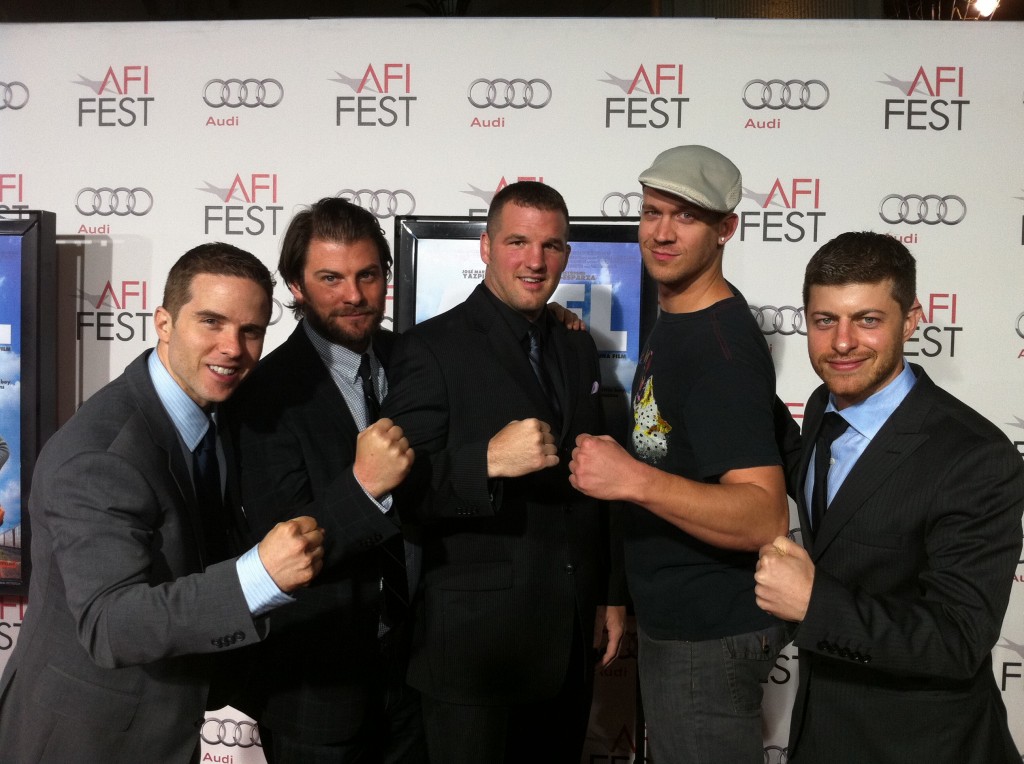
WP: Well, I’m sure it won’t take long. It’s a great film on many different levels. Do you have anything else to add before we wrap up?
EK: Well, Joe’s having a baby this week.
WP: A baby? Really? You know the sex?
JM: It’s a boy.
WP: You got a name?
EK: He can’t say. His wife told me the name, and I spilled it, and she didn’t want anyone to know. So she’s mad at me and now he can’t tell anyone.
JM: But we do have a name, yes.
WP: Is it Hamill?
EK: [Laughs] Yes!
JM: [Laughs] Yeah, Matt Hamill.
Eben and Joseph are currently in post-production on their third feature, FREE SAMPLES, produced by their production company FILM HARVEST and starring Jess Wexler and Jesse Eisenberg. For more information on HAMILL, check out the official website as well as the Facebook and Twitter pages.
If you’re an independent filmmaker or know of an independent filmmaker we should interview, email blogadmin@sagindie.org for consideration.
